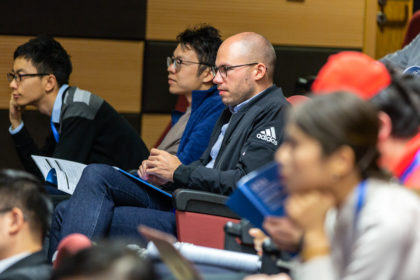
We are so grateful for the articles Julian Reese, InterVarsity Graduate and Faculty Minister at UT Knoxville, has shared with us over the past five weeks. We hope many graduate and faculty communities will discuss the practice of incarnational presence together and consider how this might be “incarnated” in their own departmental contexts. We offer here the links and summaries to all five articles as well as a list of resources for further reading Julian has shared with us.
______________________________________________

Incarnational Presence: An Introduction. Where many try to attract grads and faculty to Christian community, Julian and those he work with go to where grads and faculty are, their departments. In this post, the first of a series, Julian introduces us to this way of ministry, which he calls “Incarnational Presence.”

Incarnational Presence: The Incarnation Principle. “We first Establish Presence, looking for opportunities to develop relationships by participation in academic events, instead of relying on “attractional” ministry to get unbelieving academics to attend ours.”
 Incarnational Presence: Earning an Incarnational Voice. In this article and the next, we will think about earning an incarnational voice in the academic conversation. Here, we consider how to earn a voice in the academic culture.
Incarnational Presence: Earning an Incarnational Voice. In this article and the next, we will think about earning an incarnational voice in the academic conversation. Here, we consider how to earn a voice in the academic culture.

Incarnational Presence: The Translation Principle. Julian considers what makes a voice incarnational. What is distinctive about a voice that brings a faith-informed perspective to the academic conversation constructively?

Incarnational Presence: Encouraging Creative Participation. In this final article Julian pulls together this paradigm of incarnational presence thinking as we consider how we might encourage creative participation in the presence of God.
PARTIAL BIBLIOGRAPHY FOR INCARNATIONAL PRESENCE VISION
OUR CULTURAL CONTEXT
Hunter, James Davidson. To Change the World: The Irony, Tragedy, and Possibility of Christianity in the Late Modern World. Oxford University Press, 2010.
Marsden, George. The Soul of the American University Revsited: From Protestant to Postsecular. Oxford University Press, 2021.
Schmalzbauer, John; Mahoney, Kathleen A. The Resilience of Religion in American Higher Education. Baylor University Press, 2018.
Taylor, Charles. A Secular Age. Harvard University Press, 2007.
OUR BIBLICAL -THEOLOGICAL FOUNDATION
Hastings, Ross. Missional God, Missional Church: Hope for re-Evangelizing the West. InterVarsity Press Academic, 2012.
Rutledge, Fleming. The Crucifixion: Understanding the Death of Jesus Christ. Eerdmans, 2015.
Wright, N. T. How God Became King: The Forgotten Story of the Gospels. Harper-Collins, 1989.
OUR EVANGELISM
Newbigin, Lesslie. The Gospel in a Pluralist Society. William B.Eerdmans Publishing Company, 1989.
Smith, Gordon. Transforming Conversion: Rethinking the Language and Contours of Christian Initiation. Baker Academic, 2010.
Webber, Robert E. Ancient-Future Evangelism: Making Your Church a Faith-Forming Community. Baker Books, 2003.
OUR MANNER
Inazu, John. Confident Pluralism: Surviving and Thriving through Deep Difference. The University of Chicago Press, 2016.
Peterson, Eugene. Working the Angles: The Shape of Pastoral Integrity. William B. Eerdmans, 1987.
Peterson, Eugene. The Jesus Way: a conversation on the ways that Jesus in the way. Wm. B. Eerdmans, 2007.
Julian Reese serves Faculty and Graduate students at the University of Tennessee in Knoxvillle, Tn with InterVarsity’s GFM ministry. He is a graduate of Wheaton College (IL) with a B.A. in Bibilical Studies, and Gordon-Conwell Seminary (M.Div.). He is married to Melanie, who serves with him on GFM staff. The Reeses have three grown children on two continents.
The GFM ministry in Knoxville has coordinated the Veritas Forum at the University of Tennessee since 2005, partnering with academic departments in the University. They also sponsor an Apprentice Cohort in Incarnational Presence ministry.

Leave a Reply